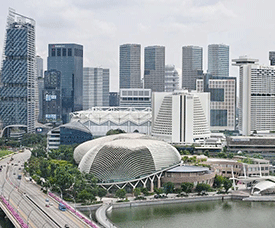 |
| Singapore scored 83 out of a possible 100 on the 2023 Corruption Perceptions Index, the same result it achieved for the 2022 index. |
Global anti-graft watchdog places Singapore as 5th least corrupt country in world index
SINGAPORE (The Straits Times/ANN) -- Global anti-graft watchdog Transparency International has ranked Singapore as the fifth least corrupt country in the world, with a score that also places the Republic as the least corrupt country in Asia.
Singapore scored 83 out of a possible 100 on the group’s 2023 Corruption Perceptions Index (CPI), on a scale with zero for highly corrupt and 100 for very clean. The Republic achieved the same result in 2022.
The highest score it recorded was 87 in 2012, when the metric was revamped by Transparency International.
The CPI surveys experts and business people, and scores 180 countries and territories on a scale of 0 to 100 by their perceived levels of public-sector corruption.
Denmark (with a score of 90) topped the overall 2023 index, maintaining its position for the sixth consecutive year, and is followed by Finland (87), New Zealand (85) and Norway (84).
Transparency International, which released its report on January 30, said two in three jurisdictions scored below 50 in 2023.
It noted that corruption levels had improved in only 28 jurisdictions, and worsened in 34 countries and territories, despite progress in criminalising corruption and establishing specialised anti-corruption institutions around the world.
“This limited progress is hardly surprising, considering the chronic weaknesses of justice systems meant to detect, investigate, prosecute and adjudicate corruption cases,” said the anti-graft organisation.
The top-scoring region was Western Europe and the European Union, but Transparency International noted that its average score – 65 out of 100 – had dropped for the first time in a decade.
Among the 31 countries assessed in the region, only six had improved scores, while eight showed declines.
Several high-ranking democracies, including Sweden (82), the Netherlands (79), Iceland (72) and Britain (71), recorded their lowest-ever scores in the index, with Britain experiencing an overall six-point decrease over the past five years.
Transparency International said the region’s “robust anti-corruption measures continue to be undermined by the weakening of checks and balances” and that the “erosion of political integrity contributes to diminishing public trust in countries’ ability to tackle the region’s ongoing challenges”.
The top five territories in the Asia-Pacific region were New Zealand, Singapore, Australia (75), Hong Kong (75) and Japan (73).
Transparency International said the latest index reveals another year of little to no meaningful progress towards curbing corruption in the Asia-Pacific region.
“For five years in a row, the average CPI score for the region stagnates stubbornly at 45 out of a possible 100.
“Very few countries show sustained turnarounds that indicate significant changes in corruption levels,” said the group of the Asia-Pacific.
Singapore saw a number of corruption probes in 2023, including the case involving former transport minister S. Iswaran, 61, who was arrested on July 11.
Iswaran, who has since resigned, was handed 27 charges on January 18, 2024, including two for corruption. The case against him is ongoing.
Ms Urantsetseg Ulziikhuu, Asian regional coordinator at Transparency International, said any impact from Iswaran’s case would more likely be seen in the medium term, rather than the short term.
“Independence of institutions, institutional checks and balances, and enforcement of existing laws, among others, would contribute to the level of perceived corruption in Singapore, and perception changes slowly over time,” she added.
Noting that Singapore is among the countries with high scores, Ms Urantsetseg said: “A country with a high score is not necessarily corruption-free.
“The CPI pays attention to the ability of governments to contain corruption and enforce effective integrity mechanisms in the public sector, which would include effective criminal prosecution for corrupt officials.”
The Corrupt Practices Investigation Bureau (CPIB) said the corruption situation in Singapore remains firmly under control.
It added that domestically, the number of public sector corruption cases remains consistently low and public perception surveys regularly conducted by the Bureau indicate strong public confidence in national corruption control efforts.
“In the World Justice Project Rule of Law Index 2023, Singapore was ranked third for absence of corruption, the top Asian nation out of 142 countries.
“The Political and Economic Risk Consultancy ranked Singapore as the least corrupt country in its 2023 Report on Corruption in Asia out of 16 economies, a position we have held since 1995,” said CPIB, adding that the latest CPI showed Singapore remains the only Asian country ranked in the top 10.
Mr Wilson Ang, partner and head of the Asia regulatory compliance and investigations practice at law firm Norton Rose Fulbright, said Singapore has retained its ranking and score due to its robust anti-corruption regime established over many years.
He added: “However, no country can afford to be complacent and Singapore has taken a strong line, as demonstrated by recent prosecutions and enforcement actions.
“We can expect that Singapore will continue to strengthen its compliance position for corporates and scrutinise senior management who set the tone at the top. In due course, we may see legislation to protect whistleblowers.”
(Latest Update January 31, 2024)
|